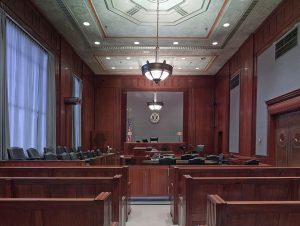 Three young men were recently arrested by Prince George’s County police officers following a traffic stop of an SUV that had been flagged by law enforcement for criminal involvement. The driver of the SUV was arrested on the scene, while the two others were arrested shortly thereafter. After arresting the driver, police sought and received a warrant to search his District Heights apartment. During the search police of the apartment and an additional home, police found a trove of stolen merchandise totaling over $10,000. The merchandise linked the defendant and his co-defendants to as many as 10 different thefts that occurred from September 13 to October 1. Police apparently discovered that the group was offering the merchandise for sale online and through personal referrals. This theft bust puts just a tiny dent in what has become a shoplifting epidemic over the last couple of years. The situation in the Washington D.C. metro area has become so dire that some stores are declining to stock frequently stolen items such as detergent and cosmetics. The issue is not limited to Washington and Baltimore however, as retailers have suffered billions of dollars of losses in recent years, as the so called “shrink” numbers continue to rise.
Three young men were recently arrested by Prince George’s County police officers following a traffic stop of an SUV that had been flagged by law enforcement for criminal involvement. The driver of the SUV was arrested on the scene, while the two others were arrested shortly thereafter. After arresting the driver, police sought and received a warrant to search his District Heights apartment. During the search police of the apartment and an additional home, police found a trove of stolen merchandise totaling over $10,000. The merchandise linked the defendant and his co-defendants to as many as 10 different thefts that occurred from September 13 to October 1. Police apparently discovered that the group was offering the merchandise for sale online and through personal referrals. This theft bust puts just a tiny dent in what has become a shoplifting epidemic over the last couple of years. The situation in the Washington D.C. metro area has become so dire that some stores are declining to stock frequently stolen items such as detergent and cosmetics. The issue is not limited to Washington and Baltimore however, as retailers have suffered billions of dollars of losses in recent years, as the so called “shrink” numbers continue to rise.
Police will apparently continue to investigate the trio of defendants, and additional charges may be forthcoming. For now, the driver, a 19-year-old from Suitland, is facing the brunt of the charges that include 14 counts of theft related offenses from the aforementioned ten different incidents. Many of the incidents are alleged to have occurred in succession, with charges being filed on eight consecutive days from September 13 to September 20. Eight of the 14 charges are felonies, including a catch-all theft scheme charge of $1,500 to $25,000. The driver was released on a $5,000 bond and is due back in court in the middle of November. It does not appear that he has any adult prior convictions in Maryland, and his juvenile record is not accessible by the public. The oldest co-defendant is a 26-year-old also from Suitland, who has additional pending theft charges out of Queen Anne’s County, while the youngest defendant, an 18-year-old, is facing two theft charges from an alleged incident on September 13. The Blog will continue to follow these cases and other similar theft schemes and may post a follow up article in the future as the cases progress.
If you or a loved one is facing theft charges or any other criminal charges in Maryland contact Prince George’s County criminal defense lawyer Benjamin Herbst anytime for a free consultation. Benjamin has successfully defended hundreds of clients in theft charges ranging from shoplifting to felony theft over $100,000. He is also an experienced juvenile theft lawyer who fights to protect the futures of all his clients. Benjamin routinely takes on complicated fraud and employee theft cases, as well as embezzlement and misconduct in office. He is licensed to practice in the federal courts of Greenbelt and Baltimore City, where he specializes in theft of government property and other federal charges. Maryland theft lawyer Benjamin has defended clients in every jurisdiction from Worcester County to Allegany County and is available 7 days a week for his clients. He has locations in Anne Arundel County and Baltimore City and can meet at a convenient location in the Eastern Shore for clients facing charges in Salisbury, Ocean City, and Queen Anne’s, Dorchester and Talbot Counties. All clients are provided with cell phone access to Benjamin for off hours access, as we firmly believe constant communication is essential to providing excellent Maryland criminal defense representation. Contact Benjamin at 410-207-2598 to learn what defenses may be available in your case and to start preparing to take on the state or federal government.
 Criminal Defense Lawyer Blog
Criminal Defense Lawyer Blog









